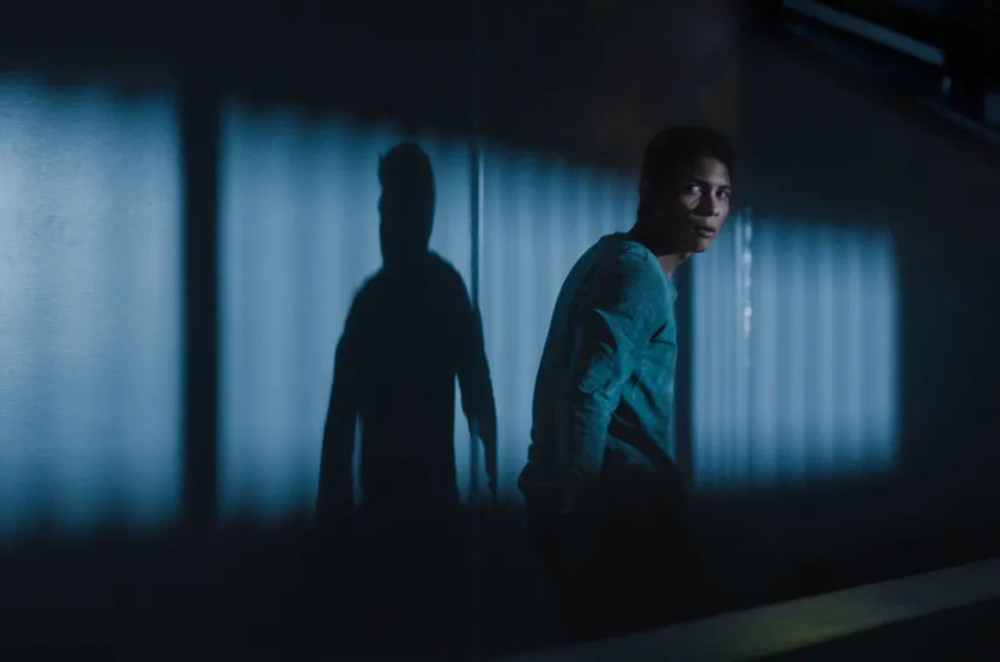Amat Escalante doesn’t mind showing you exactly what happened to Paloma Flores (Vicky Araico) in the opening minutes of “Lost in the Night,” leaving a contentious town council meeting where she sits on the board and rather than having a police escort for safety, the cops that follow her shoot up her car with her family inside and catch her before she can run off. Instead, the mystery lies in what her two children, particularly her son Emiliano (Juan Daniel Garcia Treviño), are going to do about it when they can understand in more sophisticated terms why they grew up without parents, barely preschool age when they were killed in front of them. While Emiliano’s sister volunteers for an organization that looks to identify the bodies of unmarked graves, one of which could easily include Paloma, whose remains were never located, Emiliano has to wonder whether he should give in to the means of violence that seems to rule his community in order to get the answers he wants.
Of all the uncomfortable ideas that the director of “Heli” and “The Untamed” has been capable of introducing over the course of a typically incendiary filmography, it may be the subtlest that is most discomfiting when he’s able to show how the most devastating events may not be the most obviously horrific and their effects can induce trauma for generations that can be all the more painful when the cause of it is further obscured over time. “Lost in the Night” may hardly be the first or even the millionth to suggest that money is the root of all evil, but it does so in a genuinely original way when Emiliano suspects that Paloma’s remains are somewhere on the property of a wealthy couple that’s just come to town, offering up his services as a handyman almost as soon as they show up. In a town where the promise of $10 will lead people to crawl over each other to pursue the dangerous work of hanging wire from tall poles, putting aside any fear of heights they have at their peril, Carmen Aldama (Barbara Mori), a famous singer and her husband Rigoberto (Fernando Bonilla), not to mention their influencer daughter Monica (Ester Exposito), are bound to draw a crowd, though they’ve moved to the rural locale to get away from them. Still, they all in their individual ways seem to take a liking to Emiliano, which is more than they can say for how they feel about one another, and when the family is preyed upon because of their wealth, as well as potentially Rigoberto’s past antagonism of a local religious group in his artwork, Emiliano has steady work repairing broken windows.
If the sight of a floating fleshlight, complete with a filthy inscription, that’s a centerpiece of Carmen and Rigoberto’s home is meant to shock as soon as “Lost in the Night” starts, the vulgarity of the object pales in comparison to the kind of attitude that’s behind placing it there to begin with, a notion that ultimately gives “Lost in the Night” its creeping tension when Emiliano has no doubts about how rotten the world around him is, but gradually becomes aware of how it got that way. Treviño, the stone-faced youth who always looks like he’s seen more than he should have at his age in recent turns in “La Civil,” “I’m No Longer Here” and “Robe of Gems,” is typically magnetic here, playing something akin to undercover agent when he worries he may be getting in too deep into the family’s hysterics while he tries to keep his quest for his mother’s whereabouts at top of mind. Nearly every element of “Lost in the Night” would seem to invite one to look underneath the surface when it seems a little more than coincidence that the Aldamas are all entertainers in some fashion and they set the stage for Escalante’s most melodramatic film to date where theatrics can act as one more distraction of the spiritual corruption taking place if they don’t strive to reveal the truth.
It would be easy to chalk up the bourgeois family and the police that would seem inclined to protect only them because of their fortune as villains, but even they are the product of a warped system that Escalante allows to enter his own vision when one is privy to scenes of sex and violence that don’t usually make it onto the screen and as Emiliano chases a ghost, the director is able to impressively flesh out the tortured soul of a society, all too aware of where all the bodies have been buried, but with more and more pain added with each sprinkle of dirt poured on top.
“Lost in the Night” does not yet have U.S. distribution.




